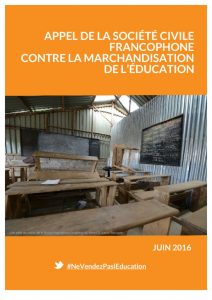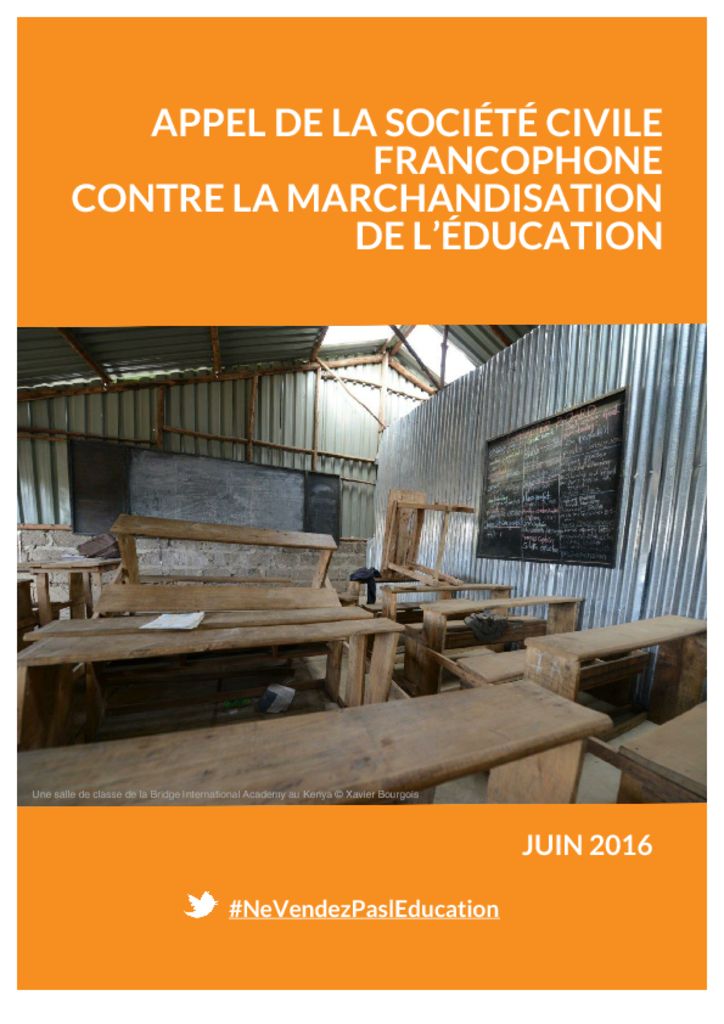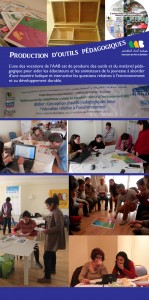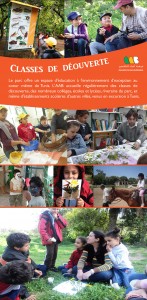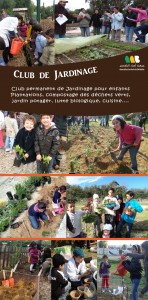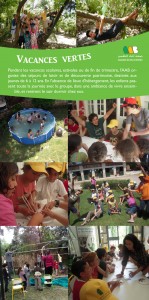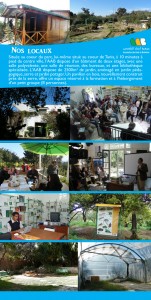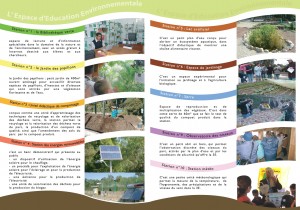Communiqué de presse, Genève, 24 mai 2016
Disponible en ligne: http://bit.ly/1ONoLqg
Le soutien controversé du Royaume-Uni (RU) aux écoles privées commerciales à bas coût (dites écoles privées ‘low-cost’) dans les pays en développement a été questionné par le Comité des Nations Unies sur les droits des enfants (CDE) (1). Ce dernier a particulièrement exprimé sa préoccupation concernant le soutien accordé par le Département britannique pour le développement international (UK Department for International Development – DfID) aux chaines d’écoles primaires et pré-primaires à but lucratif Bridge International Academies (BIA).
Hier, lors de l’examen périodique sur la mise en œuvre de la Convention sur les droits de l’enfant par Royaume-Uni, le Comité a également exprimé sa préoccupation concernant des écoles privées à but lucratif dans les pays en développement qui, avec le soutien du gouvernement britannique, résistent aux efforts faits par les gouvernements, tels que celui du Kenya, pour réglementer le secteur de l’éducation et mettre en place des normes minimales.
Ce questionnement a eu lieu lors de l’examen de la mise en œuvre de la Convention sur les droits de l’enfant par le Royaume-Uni, les 23 et 24 mai derniers à Genève.
Le Comité sur les droits de l’enfant (CDE), qui surveille le respect des droits des enfants, y compris le droit à l’éducation, a également demandé des précisions sur la volonté du Royaume-Uni de transformer tous les établissements scolaires anglais en académies.
La solide délégation du Royaume-Uni, constituée de 23 membres, a été incapable d’apporter une réponse sur le soutien de son pays aux écoles privées à l’étranger, ni sur la manière dont il évalue l’impact sur le droit à l’éducation des enfants des ‘millions de livres’ qu’elle accorde aux pays en développement dans le cadre de l’aide au développement. Le Royaume-Uni a promis de fournir une réponse écrite dans les 48 heures.
Les chaines d’écoles privées commerciales à bas coûts, telles que Bridge International Academies (BIA) sont de plus en plus examinées à la loupe en raison d’un certain nombre de préoccupations concernant la qualité de l’éducation offerte, basée sur un enseignement standardisé et de mauvaises conditions de travail; l’augmentation de la ségrégation due aux frais de scolarité; et le profit fait sur le dos de familles pauvres, tout cela étant en contradiction avec les traités relatifs aux droits de l’homme (2).
Le Royaume-Uni a alloué son aide au développement à des écoles privées ‘low-cost’ dans des pays tels que le Kenya et le Nigeria. Un peu plus tôt, sur une question concernant l’augmentation de l’aide au développement allouée à des acteurs privés dans les secteurs de l’éducation et de la santé, le CDE a demandé au Royaume-Uni s’il prévoyait d’introduire un cadre juridique pour obliger les entreprises à respecter les droits des enfants, notamment le droit à l’éducation.
Delphine Dorsi, Coordonnatrice exécutive du Right to Education Project (3), a réagi: « Les questions du Comité et l’absence de réponses de la part du Royaume-Uni confirment nos inquiétudes sur le fait que le Royaume-Uni pourrait agir en violation de ses obligations en matière de droits de l’homme en nuisant au droit des enfants à l’éducation dans des pays pauvres. »
Abraham Ochieng, du East African Centre for Human Rights, basé à Nairobi, au Kenya, a ajouté: « L’expansion rapide des écoles à but commercial avec le soutien de l’aide au développement compromet le droit à l’éducation et les efforts du gouvernement pour améliorer l’offre éducative au Kenya. Il est essentiel pour la société civile Kenyane, dans un dialogue avec le gouvernement, de remédier à cette situation, et pour les pays partenaires tels que le Royaume-Uni de recentrer leur soutien aux écoles publiques gratuites fournissant une éducation de qualité, plutôt que de porter atteinte au droit à l’éducation au profit d’intérêts commerciaux. »
Christine Blower, Secrétaire générale au Syndicat national des enseignants (NUT), a aussi réagi à la question connexe posée par le Comité à la délégation du Royaume-Uni concernant la volonté du gouvernement de transformer toutes les écoles en académies: « Le Comité a raison d’interroger le gouvernement britannique au sujet de son programme de privatisation à la fois sur son territoire et à l’étranger. Nous savons que l’intention du gouvernement de complètement transformer les écoles en académies en Angleterre va conduire à la privatisation de notre système éducatif. L’éducation est un droit humain et un bien public, pour le bien des apprenants et de la société, et non pour des intérêts privés.»
FIN
Contacts :
- Delphine Dorsi (Coordinatrice exécutive, Right to Education Project): +44 77 06 756 077 / delphine.dorsi@right-to-education.org
- Caroline Cowie (Bureau de presse, NUT): +44 78 794 480 061 / +44 0207 380 4706
- Sylvain Aubry (Conseiller juridique et politique, Global Initiative for Economic, Social and Cultural Rights): +33 7 81 70 81 96 /sylvain@globalinitiative-escr.org
Notes :
- Mme Amal Aldoseri, membre experte du Comité des Nations Unies sur les droits de l’enfant a posé la question suivante à la délégation britannique lors de l’examen périodique de la mise en œuvre par le Royaume-Uni de la Convention relative aux droits de l’enfant: « Ma dernière question sur cette thématique est sur l’enseignement privé. Plus précisément sur l’aide au développement allouée par le gouvernement du Royaume-Uni aux Bridge International Academies (BIA), installées au Kenya et dans d’autres pays, qui sont des écoles privées commerciales à bas couts, financées entre autres par le gouvernement du Royaume-Uni. Nous avons évoqué cela avec le gouvernement kenyan lors de notre dialogue avec eux un peu plus tôt cette année, et le gouvernement kenyan a du mal à réglementer ces écoles, mais avec le soutien du gouvernement britannique, les BIArésistent à toutes formes de règlementation visant à maintenir des normes acceptables et professionnelles. Quels sont vos efforts pour surveiller et contrôler l’utilisation des millions de livres données par le Royaume-Uni aux pays en développement afin de s’assurer que ces fonds ne conduisent pas à des violations des droits de l’enfant? Existe-il un mécanisme à cet effet pour évaluer l’impact de ces fonds, par exemple, sur l’augmentation de la ségrégation entre les groupes socio-économiques dans les pays bénéficiaires de ces fonds? Et sur une question connexe, pouvez-vous s’il vous plaît informer le Comité sur la volonté de transformer toutes les écoles primaires et secondaires en académies en Angleterre d’ici 2022. Cela a été reporté, mais nous aimerions entendre des clarifications à ce sujet. »
- Pour plus d’informations, voir la Déclaration conjointe en réponse à la Banque mondiale sur les Bridge International Academies (mai 2015) (en anglais):http://bit.ly/1JgKrrM
- Le Right to Education Project / Projet sur le droit à l’éducation a présenté un rapport au CDE: “The UK’s support of the growth of private education through its development aid” (en anglais): Rapport complet (Octobre 2015): http://bit.ly/1suPlQ1; Résumé du rapport (Avril 2016): http://bit.ly/1qwqslR; Informations complémentaires annexées au rapport (Avril 2016): http://bit.ly/1Thfmi4




